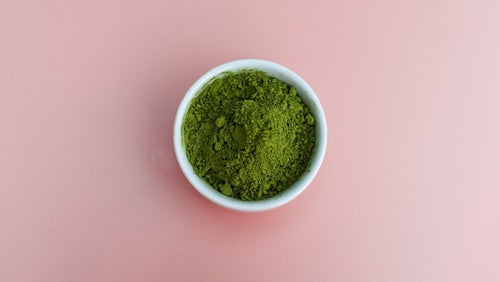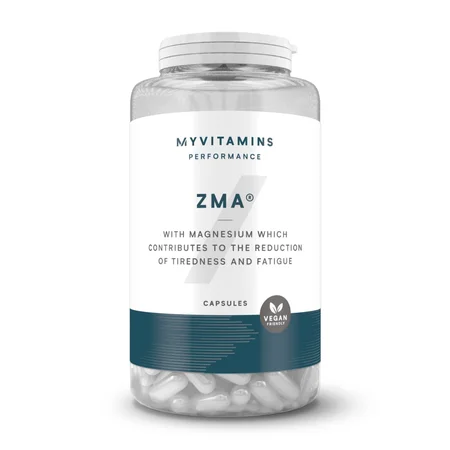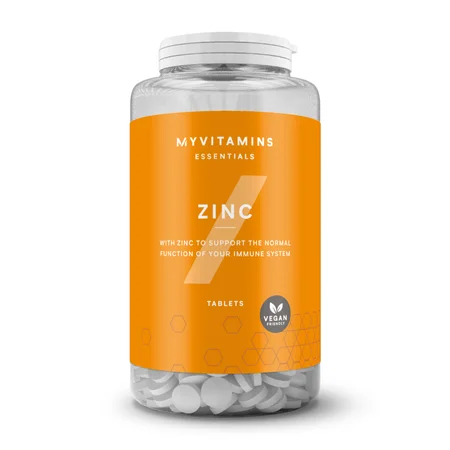
Knowledge of the function of each of the three nutrients in ZMA has led to making it a popular supplement with the potential to help boost strength, lose weight, improve sleep and energy, and more. Read on to find out what ZMA is, what benefits it may have, and how it could potentially improve your health and fitness.
What is ZMA?
ZMA, or Zinc Magnesium Aspartate, is a supplement made up of two minerals (zinc and magnesium) and vitamin B6. All three components play important roles in metabolism and other functions in the body. Research has shown that athletes and those who exercise regularly can have lower levels of zinc and magnesium, this has meant that ZMA has become a pretty popular training supplement.1
Zinc
Zinc is an essential trace element that our body uses in various enzymes and processes throughout the body. Specifically, it plays many roles in the metabolism of macronutrients (carbs, fat, and protein), cell replication, protein synthesis, growth, and wound healing.1,3
Zinc can be lost in sweat, which is one theory as to why it’s lower in athletes. Low levels of zinc (and magnesium) have been thought to limit the production of testosterone and IGF-1 (insulin like growth factor), suggesting that a deficiency could limit strength and anabolism. Zinc is also not stored well in the body, requiring us to obtain it daily from our diet or a supplement. This is why taking ZMA, a good source of zinc, can be helpful.
Magnesium
Like zinc, magnesium is present in many foods and is used widely throughout the body for biochemical reactions. Some of the key processes that involve magnesium are energy production, muscle and protein synthesis and function, bone health, and the breakdown of glycogen for energy.4
Like zinc, it can be lost through excessive sweating and stress, and is commonly found at lower levels in athletes.1,4 Our kidneys closely regulate the body’s level of magnesium and can help to excrete less when the body’s magnesium levels are low.4
Vitamin B6
Our bodies use vitamin B6 for many of the same metabolic processes as zinc and magnesium, making it another component of most ZMA supplements.5 Vitamin B6 is known for its roles in the breakdown of food for energy, brain health and development (in infants) and the immune system.
What does ZMA do?
Based on the knowledge that athletes typically have lower levels of zinc and magnesium, coupled with their typical metabolic functions in the body, ZMA is theorised to have benefits such as the potential to increase strength and muscle building.1
One study showed that ZMA, combined with resistance training, showed increases in testosterone, IGF-1 (both anabolic hormones), and muscle strength.2 Another study was unable to duplicate this effect, but did show increases in zinc levels over time, meaning the subjects may have been zinc deficient to start and couldn’t reap the benefits of the supplement within the time of the study.1
More studies focusing on the impact of ZMA supplementation in athletes who maintain adequate levels of zinc are needed to further understand all of its potential benefits.
What are the benefits of ZMA?
There are many potential benefits of ZMA based on the important involvement of zinc, magnesium, and vitamin B6 in the body. Here are a few of them:
May increase muscle strength
If you’re weight lifting, one of the main benefits of supplementing ZMA is that it may increase strength. Because zinc plays a role in protein synthesis and is assisted in protein metabolism by vitamin B6, optimising these two micronutrients could boost muscle building and lead to increases in strength. Over time, increases in strength lead to increases in size and metabolism, which can help lead to weight loss.
Can boost immune health
Zinc is well known as an immunity booster and is commonly used to fight off even the common cold. Taking ZMA to maximise zinc levels can help prevent illness and keep you feeling healthy and strong for your training.
May improve energy levels
Whether you go to the gym or not, improving energy levels may be another benefit of ZMA which makes you want to supplement it.
Magnesium and vitamin B6 are so crucial for the metabolism of our food for energy that taking ZMA regularly can help us to function at the highest level
Could help you sleep better
Magnesium and zinc are both commonly used to aid in better sleep, and better sleep can lead to faster recovery and better workouts.
May lead to weight loss
Just like the fact that athletes can be deficient in zinc and magnesium, similarly low levels occurred in individuals with obesity. Scientists provided a ZMA supplement to 60 research participants and found that increasing zinc levels helped to improve BMI, body weight, and triglyceride readings.6 This exciting research could provide benefits to millions.
Looking for more weight loss advice? Read this next.
ZMA Dosage
The dosage of ZMA supplements is typically higher than the recommended daily amounts of each nutrient due to the fact that supplements are always absorbed as well as food sources.
However, too much zinc can have negative side effects, so consider your regular dietary intake of high-zinc foods when deciding the best dosage for you, as well as your body size and activity level. Look for supplements containing about 100-200% the daily value of each nutrient.
Which type of ZMA supplement is best for me?
While powdered forms of many supplements exist, ZMA is commonly found in pill form. This is because it’s recommended to take it on an empty stomach for best absorption.
Typically, it’s taken before bed with water only on an empty stomach. If you take a powdered form, try to take it with only water instead of mixing it into a recovery shake as calcium from your whey can affect zinc uptake.
There hasn’t been significant research done to support than one type of ZMA is better than another.
Take Home Message
While zinc, magnesium, and vitamin B6 are found in many foods in our diet, we may not be getting enough to support the demands of our workouts.
The potential benefits of ZMA from performance to better energy levels and weight loss make it an exciting supplement that researchers continue to explore. For those who are deficient in zinc, magnesium, or vitamin B6, taking ZMA as part of your supplement routine could be the game changing boost you’re looking for.
READ THESE NEXT:

How Many Protein Shakes A Day is Healthy?
An experts advice on what you need, depending on your goals....

Whey Protein Timing | The Best Time To Take Protein Shakes
We reckon any time is a good time, but here's what the experts say....

7 Health Benefits Of Green Tea
Reduce inflammation, decrease body fat, improve blood flow and loads more....

Claire is a Registered Dietitian through the Academy of Nutrition and Dietetics and a board-certified Health and Wellness Coach through the International Consortium for Health and Wellness Coaching. She has a Bachelor of Science in Biology and a Master’s degree in Clinical Dietetics and Nutrition from the University of Pittsburgh.
Talking and writing about food and fitness is at the heart of Claire’s ethos as she loves to use her experience to help others meet their health and wellness goals.
Claire is also a certified indoor cycling instructor and loves the mental and physical boost she gets from regular runs and yoga classes. When she’s not keeping fit herself, she’s cheering on her hometown’s sports teams in Pittsburgh, or cooking for her family in the kitchen.
Find out more about Claire’s experience here.
1. Wilborn, C. D., Kerksick, C. M., Campbell, B. I., Taylor, L. W., Marcello, B. M., Rasmussen, C. J., … & Kreider, R. B. (2004). Effects of zinc magnesium aspartate (ZMA) supplementation on training adaptations and markers of anabolism and catabolism. Journal of the International Society of Sports Nutrition, 1(2), 12.
2. Kreider, R. B., Wilborn, C. D., Taylor, L., Campbell, B., Almada, A. L., Collins, R., … & Kerksick, C. M. (2010). ISSN exercise & sport nutrition review: research & recommendations. Journal of the international society of sports nutrition, 7(1), 7.
3. National Institutes of Health Office of Dietary Supplements. (2019, July 10). Zinc Fact Sheet for Health Professionals. Retrieved from https://ods.od.nih.gov/factsheets/Zinc-HealthProfessional/
4. National Institutes of Health Office of Dietary Supplements. (2019, July 9). Magnesium: Fact Sheet for Professionals. Retrieved from: https://ods.od.nih.gov/factsheets/Magnesium-HealthProfessional/
5. National Institutes of Health Office of Dietary Supplements. (2019, July 11). Vitamin B6 Fact Sheet for Consumers. Retrieved from: https://ods.od.nih.gov/factsheets/VitaminB6-Consumer/.
6. Payahoo, L., Ostadrahimi, A., Mobasseri, M., Bishak, Y. K., Farrin, N., Jafarabadi, M. A., & Mahluji, S. (2013). Effects of zinc supplementation on the anthropometric measurements, lipid profiles and fasting blood glucose in the healthy obese adults. Advanced pharmaceutical bulletin, 3(1), 161.





